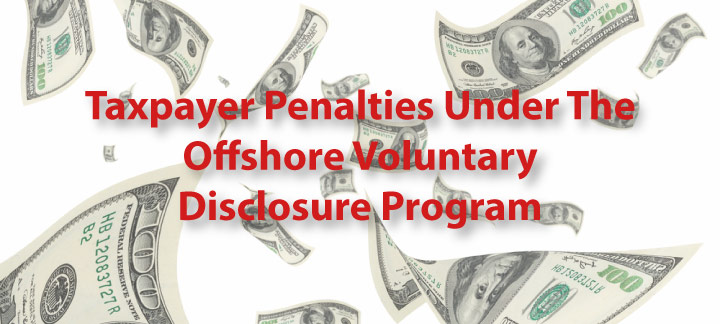Taxpayer Penalties Under OVDP
Under the Offshore Voluntary Disclosure Program, taxpayers have the opportunity of making a voluntary disclosure of all their offshore financial accounts and assets to the IRS. In exchange for making the voluntary disclosure, the IRS offers taxpayers a decreased risk of criminal prosecution and assorted fines and penalties. In order to validly take part in the program, the taxpayer’s disclosure must be timely, complete, and accurate. In addition to the requirements placed on the disclosure itself, OVDP requires that the taxpayer pay all tax, interest, and any accuracy-related penalty associated with the relevant tax years.
Penalties Associated with an OVDP Submission
A taxpayer submitting an application for OVDP may be subject to certain fees and penalties. First, there is a 27.5% offshore penalty which applies if the aggregate balance of the taxpayer’s offshore accounts exceeds $75,000. This penalty is calculated using the highest aggregate balance of all offshore accounts over an eight-year period. This penalty is reduced to 12.5% if the aggregate balance of the offshore accounts is less than $75,000. The offshore penalty may actually be increased to 50% if either a foreign financial institution at which the taxpayer has or had an account becomes publicly identified as being under investigation or as cooperating with a government investigation. This 50% offshore penalty also applies to taxpayers who have a “facilitator” that is being investigated by the IRS, and is an increase from the 27% penalty that applied under 2012 OVDP.
Taxpayers may also be subject to accuracy-related penalties under IRC § 6651(a)(1) and failure-to-file penalties under IRC § 6651(a)(2). A taxpayer submitting an application for OVDP may also be required to pay 20-percent accuracy-related penalties under IRC § 6662(a) on the full amount of your offshore-related underpayments of tax for all years.
Arrangements with the IRS Based on Inability to Pay
If the taxpayer is unable to pay the back taxes, interest, and penalties related associated with the OVDP submission, it may be possible to enter into a payment arrangement with the IRS. In order to establish such an arrangement with the IRS, the taxpayer has the burden of demonstrating inability to pay. This showing must be made to the IRS’s satisfaction and should be based on a review of the taxpayer’s full disclosure of all income and asset sources, both foreign and domestic. If the IRS agrees that the taxpayer has an inability to pay, then an arrangement will be made allowing the taxpayer to resolve all outstanding liabilities. These financial arrangements must be made before the taxpayer will be qualified for OVDP.
How a Tax Attorney Can Help
If you have undisclosed offshore foreign accounts or assets, you may be eligible to participate in OVDP. In order to evaluate whether OVDP is the right decision for your international tax situation, you should consider consulting a knowledgeable tax attorney. The OVDP program is rapidly changing, but a tax attorney can help you navigate the confusing aspects of the IRS program.
San Diego Tax Attorney, William D Hartsock, Esq. has been successfully helping clients with tax issues related to their foreign assets since the early 1980s. Mr. Hartsock offers free consultations with the full benefit and protections of attorney client privilege to help people clearly understand their situation and options based on the circumstances of their case. To schedule your free consultation simply fill out the contact form found on this page, or call (858) 481-4844.



Comments (0)